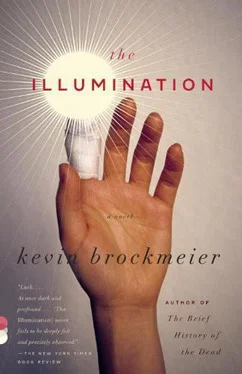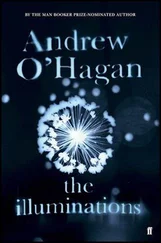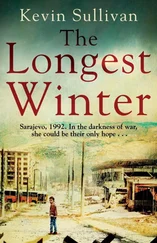Ryan lost sight of her as his car pulled away. The next day, alone, he swung into the Superstop where she worked and found the gas pumps disconnected. Someone had nailed a sheet of plywood over the door, writing across it in big handpainted letters, CLOSED DUE TO VANDALISM, ROBBERY, AND THE “CROOKS!!” AT PATTERSON INSURANCE. He went over to the window and peered inside. The damage was considerable. Most of the shelves had been overturned. The microwave was missing its door. The cash register was lying busted in a pool of blank lottery tickets. The soda dispenser had been torn from its cords and hoses, staining the wall with plumes of dark brown syrup. The road maps and potato chips, Starlite mints and charcoal briquettes, had all been swept into a reef beneath the shattered glass of the freezers. Suddenly it seemed to Ryan that he had looked out over this same vista a million times before, as if he were a rich man and these broken machines every morning were the city that greeted him as he stood at his penthouse window. He found the feeling hard to shake.
Gradually he would forget nearly everything about Brinkley, Arkansas, just as he had forgotten nearly everything about the dozens of other small towns he had visited over the years, but for the rest of his life, every time he saw a skeleton chandeliering its way down a stand in a biology classroom, he would think of the girl whose bones fluoresced with pain. He never did find out what was wrong with her.
In the unseasonably warm October that followed Ryan’s fifty-sixth birthday, he received a letter from the Greater Council of Evangelical Churches thanking him for his fourteen years of service and asking him to give some thought to accepting a post in Ouagadougou, the capital of Burkina Faso, right in the middle of the 10/40 Window. He would be working in the literature ministry, the letter said, consulting with a team of African Christians who were translating the Bible into a local trading language called Dioula. “May God continue to bless you, Brother Shifrin,” the last paragraph read, “and may we ask that you give this matter your timely and most prayerful consideration.”
Prayerful consideration: that was the phrase that did it. It was one of his sister’s pet expressions, and no matter how often he heard it, it always seemed to ring with the sound of her voice.
Dear Lord, we come to You with prayerful consideration .
Well, I’ve given it some prayerful consideration, and I have to disagree with you there, Ryan .
Look, it failed the first time around, and the second time, too, so let me ask you, Dr. Bragg, with all prayerful consideration, why on earth would I put myself through chemotherapy again?
And so, because Ryan was willing to indulge the idea that there was a path laid out for him and it would be a mistake not to follow it, and because he knew what Judy would have done, he accepted the church’s invitation.
On his first day in Ouagadougou, he took a taxi from the airport to the hospitality house. The driver’s English was heavily accented, his words popping and rounding in on themselves like water pouring through a concrete pipe. Ryan’s brain lagged a few seconds behind in deciphering them, as when he asked what Ryan was doing in Burkina Faso. “Ah fume first of all?”
“Pardon?”
“The film festival, yeah?”
“Ah. No. I’m here on business. With the church.”
“The church. Christian, yeah? Not Muslim.”
“That’s right. Christian, not Muslim.”
The driver fell silent as a squadron of polished red and green motorbikes buzzed past him. Soon he pulled to a stop and said something about “the varieties of Heaven.” After a moment, Ryan was able to remodel the remark into, “The ride is over, sir.” His own misheard version of the words lingered with him, though, and as the months passed, he found himself considering their implications. What was Heaven, he wondered, and what were its varieties? He envisioned a system of countless Heavens, each assembled according to the desires of the person to whom God graced it. A Heaven of immaculate brushed metal planes. A Heaven of cheeseburgers and big-breasted redheads.
The Burkinabè were developing a new, more colloquial translation of the Bible, modeled after the Contemporary Living Version that had become so popular recently in America. Ryan’s colleagues worked with a swift good humor, completing ten to twelve pages a day. There was Souleymane Ouedraogo, a small, courtly man with the gentle speaking cadences and arched hairline of an economics professor; his wife, Assetou, who carried herself like a lamppost, with the rigid back and flexile neck of a woman who was so eager to articulate her thoughts that her body had evolved into nothing more than a structure to prop up her head; and then there was David Barro, barely out of his teens, an amiably bedraggled boy who always had crumbs on his shirt and smelled of the French bakery above which he kept his room. For Souleymane, Ryan imagined a Heaven of ocean waves the texture of long-haired mink. For Assetou, he imagined a Heaven of polite conversations in candlelit restaurants. David Barro, he was sure, would choose the Heaven he had already been given, a Heaven of good looks and youthful well-being and the aroma of bread baking forever in stone ovens.
Ryan was there to assist the three of them with the nuances of conversational English. Often his efforts to clarify some detail of the American vernacular amused them for reasons he did not understand, as when he attempted to explain a verse from the Song of Solomon with the words “making out, you know, heavy petting,” and they exchanged stares with one another, struggling to keep their lips twisted shut, then burst into spirited laughter. Little by little he forged a real friendship with them. The Christianity they practiced was colored by the animism that was their cultural heritage, just as his own Christianity, he was sure, was colored by his middle-class Western heritage, a heritage of—what? Good taste. Christmas gifts. Summer barbeques. But he was curious about their beliefs, and for the first time in his decade and a half of mission work, he did not reproach himself for adopting an anthropologist’s stance toward the subtleties of their faith. Often, after they had finished the day’s pages, he would join them for a drink, following them around the corner to a posh little bar with casement windows and shea-wood tables. Ryan would quiz them: Did the people of Burkina Faso believe that animals had souls? What about plants, stones, rivers, houses? And if they did have souls, were they capable of suffering? Could the Earth itself suffer? If we wounded it gravely enough, would it burst into light? No, of course not , David Barro would answer, chuckling lightly, or, Yes, of course , Souleymane would say, shaking his head at Ryan’s credulousness, and in return they would ask him various questions about America—how many guns he owned or what his local theme park was named. Every so often, the waiter whose job it was to collect the bottles from the tables would come by and slip their empties into the large front pocket of his apron, striding away with a heavy clinking sound.
For the first time since he was a teenager, Ryan felt the joy and surprise of discovering a whole new set of friends. He looked back fondly on the days when he had to force himself to rehearse their names so he wouldn’t forget them. Souleymane. Assetou. David Barro.
The three of them were working on the final chapters of Ezekiel the day the bomb propelled a thousand spurs of metal through their bodies. Ryan was returning from a coffee run when it happened. He stood across the street from the building they all shared, waiting for a gap in the stream of cars and bicycles, and a heavy percussive boom washed over him, and he flinched. At first, he imagined the sound was a lightning strike. The blast was so loud that it temporarily interrupted his hearing—only slowly did the din of horns and engines filter back into the silence. When he lifted his head, he saw a black, almost liquid smoke billowing from the windows of his office. Horrified, he rushed into the street, thinking that he could rescue the others if only he made it to them in time, but a dozen of the city’s ubiquitous red and green motorbikes suddenly sped past and forced him to return to the curb.
Читать дальше












